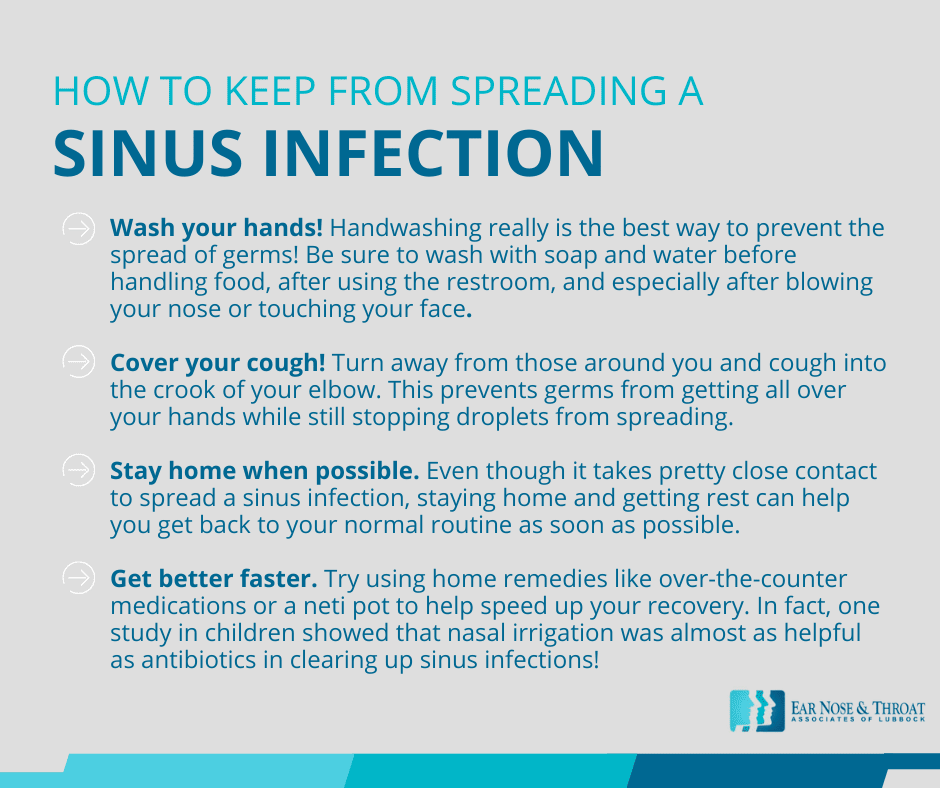How To Avoid Spreading Your Contagious Sinus Infection

The old adage, “sharing is caring,” doesn’t apply to illnesses.
But with over 30 million Americans diagnosed with sinus infections every year, how can we be sure we aren’t spreading this particular ailment to those around us?
Should we to go to work or to the grocery store with a sinus infection? Or should we call in sick and order our groceries online?
Is a sinus infection contagious? And if it is, should you stay home? Wear a mask? Or carry on as usual?
What Happens in Your Body During a Sinus Infection?
One in seven adults will be diagnosed with a sinus infection in any given year. But do we really know what our sinuses are?
Sinuses are air-filled spaces inside the skull that produce a light coating of mucus, which drains through the nose. They’re supposed to stay open and aerated, but sometimes their outflow tract can become blocked. When this happens, the mucus gets backed up and becomes trapped in the sinuses.
Are There Different Types of Sinus Infections?
You can describe sinus infections in a couple different ways.
Describing a Sinus Infection by Location
Each of your sinuses has a different name. You can describe a sinus infection according to which sinuses are affected.
For example, if your congestion is in your frontal sinuses, you have a frontal sinus infection. The frontal sinuses are directly behind the lower forehead.
You have four sets of sinuses, called paranasal sinuses, in four areas around your nose:
- frontal sinuses — behind your lower forehead
- maxillary sinuses — behind your cheekbones
- ethmoid sinuses — between your eyes
- sphenoid sinuses — deep behind your nose
A sinus infection can block any combination of these sinuses.

Describing a Sinus Infection by Cause
Another way to describe a sinus infection is by what kind of germ causes it. Most sinus infections are caused by viruses, just like the common cold.
Viral sinus infections generally end on their own without any medical intervention. They usually only affect the upper respiratory system, with symptoms like runny nose, sore throat, facial pressure, congestion and headache.
But sometimes viral infections can turn into bacterial infections. Inflamed, blocked-off sinuses encourage the kind of moist, vulnerable environment where bacteria can thrive.
You might have a bacterial sinus infection if your symptoms linger beyond about a week. If your drainage turns yellow or green, that could mean your viral infection has turned bacterial.
Bacterial sinus infections typically need a little help from antibiotics to clear up.
Lastly, even though the vast majority of sinus infections are caused by viruses and bacteria, it is possible to have a sinus infection caused by a fungus. Most fungal sinus infections are caused by an allergic reaction to a fungus in the air, like black mold. This type is called “allergic fungal sinusitis.”
Another type of fungal sinus infection called “invasive fungal sinusitis” exists, but is extremely rare. People who are otherwise healthy don’t get this infection. This type of infection is possible in severely immunocompromised people, such as those going through chemotherapy or with poorly controlled diabetes.
Is a Sinus Infection Contagious?
When you have a cold, the flu or COVID, the infectious particles replicate themselves in the nose. These illnesses also tend to cause coughing and sneezing, which project these germs out of your body. For this reason, you can easily spread these bugs to anyone around you.
But the infectious material in a sinus infection is behind the face, not actually in the nose. So while it’s possible to spread a sinus infection, they don’t spread easily without very close contact.
By taking a few precautionary measures, you can go about your daily life without fear of spreading your sinus infection to others.
How Can You Keep from Spreading a Sinus Infection?
Try incorporating these common sense practices to keep from spreading your sinus infection.
- Wash your hands! This seems basic, but it always bears repeating. Handwashing really is the best way to prevent the spread of germs! Be sure to wash with soap and water before handling food, after using the restroom, and especially after blowing your nose or touching your face.
- Cover your cough! Feeling a tickle in your throat? Turn away from those around you and cough into the crook of your elbow. This prevents germs from getting all over your hands while still stopping droplets from spreading.
- Stay home when possible. Even though it takes pretty close contact to spread a sinus infection, staying home and getting rest can help you get back to your normal routine as soon as possible.
- Get better faster. Try using home remedies like over-the-counter medications or a neti pot to help speed up your recovery. In fact, one study in children showed that nasal irrigation was almost as helpful as antibiotics in clearing up sinus infections!
What Increases the Risk of Getting a Sinus Infection?
Environmental and seasonal allergies can increase your risk of developing a sinus infection. Allergies don’t cause sinus infections, but they do increase their likelihood. Allergies cause inflammation, swelling and drainage, and all of these things increase the likelihood of a sinus obstruction.
When Should You See a Doctor About Your Sinus Infection?
Most sinus infections stay viral and resolve on their own. But if home remedies aren’t helping, if your drainage turns yellow or green, or if your sinus infection sticks around for more than a week or 10 days, it might be time to give your ENT doctor a call.
Still have more questions about whether your sinus infection is contagious? Not sure if you’re dealing with a viral or bacterial infection? Contact ENT Associates of Lubbock today, and we can help you figure out your next steps!
Dr. Cuthbertson is a physician at Ear Nose & Throat Associates of Lubbock. He joined the team at ENT Lubbock from Houston, where he was chief resident of the prestigious Bobby R. Alford Department of Otolaryngology at Baylor College of Medicine. He is board certified in Otolaryngology and Head & Neck Surgery and has quickly built a reputation, not only as an extremely skilled surgeon, but as an approachable and compassionate clinician adept in the newest standards and technologies. Learn more about Dr. Cuthbertson.
Categories:








